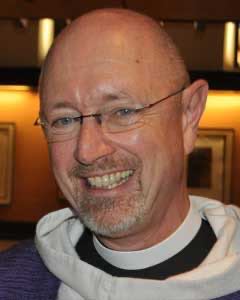
John Travolta stars as Jan Schlichtmann, a tenacious personal-injury attorney whose fierce determination entangles him in a case that threatens to destroy him, in Touchstone Pictures’ legal thriller based on a true story, A Civil Action.
WHAT ARE THE THINGS that change people in significant ways? At a time when there’s much interest in self-help and personal growth, this question of what effects real change is a lively one. And a Lenten one – because in the season of Lent the church invites us to look deeply, repent towards change and a new life.
The change in a life’s direction is documented in two recent movies: the American film, A Civil Action, starring John Travolta and Robert Duvall, and the Brazilian film, Central Station, starring Fernanda Montenegro and introducing Vincius de Oliveira. In both films, the main characters are changed not so much by their own efforts but by the effects of circumstances beyond their control.
A Civil Action is based on Jonathan Harr’s non-fiction best seller of the same name and tells the story of a lawsuit between residents of the city of Woburn, Mass. and two large corporations accused of polluting water. Travolta plays Jan Schlichtmann, a personal injury lawyer who, with a few colleagues, takes on cases they believe they can win. At the beginning of the film, Schlichtmann documents the “worth” of various victims: a white male professional struck down in his prime gives the biggest payoff; a dead child is worth the least of all. He’s a cynical lawyer, and he intends to tell the parents of the 12 Woburn children who died of leukemia allegedly caused by the polluted water, that he cannot take the case, because he could not win. But their pain and suffering gets to him – his firm takes on the case and he finds himself in court against corporate lawyers, including the brilliant Jerome Facher (Robert Duvall).
In the courtroom, you have the classic set-up: a David and Goliath confrontation. Schlictmann loses his bearings: he is so caught up with the grief of the families, so convinced about the righteousness of his cause that he gambles recklessly winning a moral battle but losing his practice, his colleagues and even the respect of his clients.
This is a very unconventional movie about the law – we don’t have the clear-cut resolution so often shown in movies about lawyers. But what is shown is a personal transformation from arrogance and pride to humility and repentance. Director Steven Zaillian’s movie is a good Lenten meditation on losing the world, but gaining your soul.
As is Walter Salles’ film, Central Station. Set in Brazil, it begins in a little booth in a Rio de Janeiro rail station where Dora, a retired school teacher (Fernanda Montenegro), writes letters for people who are illiterate. But Dora’s a cynic: she destroys most of the letters. One day, a mother and her son use her services to send a letter to the mother’s missing husband, the boy’s father. Soon after, the mother is struck down by a bus in the busy streets, leaving her son Josue (Vincius de Oliveira) knowing only one person in Rio: Dora.
Then begins a road movie, Dora and Josue looking for his father. They travel the countryside in busses and hitching rides in trucks. Dora is a selfish person – she travels with Josue as much to be rid of him as to help him. But as their journey progresses, she is transformed. She becomes less focused on herself, less anxious to return to her life as she knew it, and more able to appreciate the uniqueness of her situation as an opportunity to be helpful to others.
This is not a feel-good film. It’s hard-edged and gritty in its approach to the impoverishment and deterioration of life in Brazil. But with luminous performances by Fernanda Montenegro and Vincius de Oliveira (a ten-year-old shoe-shine boy discovered by the director in an airport), Central Station is a strangely touching and insightful film. Like A Civil Action, it holds up human transformation not as an act of will, but as an invisible dynamic, working from within, changing hearts and minds, leading to greater and deeper compassion.
In the church we name that dynamic the Holy Spirit, the Lord, the giver of life.
Peter Elliott is dean of Christ Church Cathedral, Vancouver, and a member of the board of directors of the Vancouver Film Festival.




